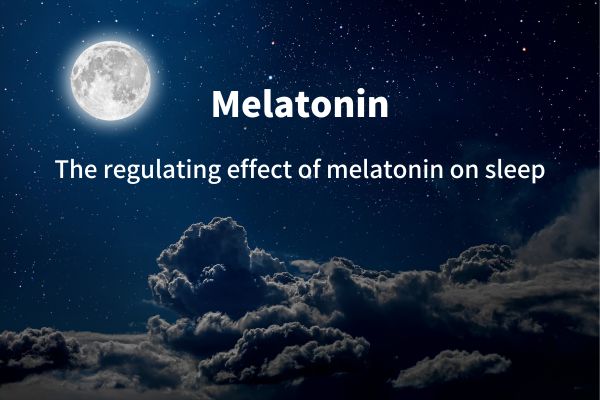Sleep is an important part of human daily life, which has an important impact on individual’s physical and mental health, physiological function and cognitive function. Melatonin, a hormone secreted by the pineal gland, plays a key role in regulating sleep rhythm and maintaining sleep status. This article will review the regulating effect of melatonin on sleep from the perspective of professional literature.
The structure and secretion principle of melatonin
Melatonin is a kind of indole hormone synthesized and secreted by the pituitary gland of the mammalian pineal gland, which has obvious rhythm. In an environment with sufficient light, the retina senses light and inhibits melatonin synthesis and secretion through the retina-hypothalamic-pineal axis. In the dark environment, the retina does not feel light, and promotes the synthesis and secretion of melatonin through the retina-hypothalamic-pineal axis.
The impact of melatonin on sleep quality
Melatonin promotes sleep primarily by interacting with specific melatonin receptors to regulate the circadian clock and inhibit wakefulness. During the night, melatonin levels rise, helping to adjust the body’s biological clock and bring the individual to sleep. At the same time, melatonin can also help maintain sleep by suppressing wakefulness. Studies have shown that the regulatory effect of melatonin on sleep is closely related to the dose and time of administration.
Three, melatonin disorders and sleep-related diseases
Dysregulation of melatonin can lead to sleep disorders and other sleep-related disorders. For example, sleep disorders such as insomnia, shift syndrome, and difficulty adjusting to jet lag are related to the disturbance of melatonin secretion rhythm. In addition, some studies have shown that insufficient melatonin production may also increase the risk of Alzheimer’s disease, depression and other diseases.
conclusion
The role of melatonin in regulating sleep has been extensively studied at multiple levels. However, despite the well-established role of melatonin in regulating sleep, there are still many questions that need to be further explored. For example, the specific mechanism of action of melatonin still needs to be further studied; The effect of melatonin on sleep regulation may be different in different people (such as people with different ages, genders and living habits). And explore the interaction between melatonin and other physiological and psychological health factors.
In addition, it is worth noting that although the application of melatonin in regulating sleep shows promising prospects, its safety, efficacy and optimal use still need further clinical evidence. Therefore, future research directions should include conducting more clinical trials to verify the actual effect of melatonin in improving sleep and related disorders.
reference
Bachman,J.G.,&Pandi-Perumal,S.R.(2012).Melatonin:clinical applications beyond sleep disorders.Journal of pineal research,52(1),1-10.
Brayne,C.,&Smythe,J.(2005).The role of melatonin in sleep and its clinical significance.Journal of Pineal Research,39(3),
Post time: Sep-27-2023
